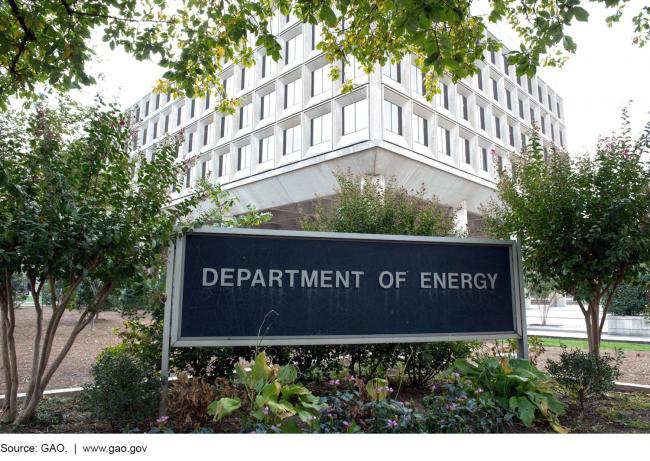Nuclear Weapons: NNSA Needs to Determine Critical Skills and Competencies for Its Strategic Materials Programs
Fast Facts
The National Nuclear Security Administration manages programs related to securing and processing uranium, plutonium, tritium, and lithium—materials critical to national security. NNSA will spend an estimated $7.7 billion to manage these programs over the next 5 years.
NNSA has set program requirements (such as developing cost and schedule estimates) for these programs but hasn't fully met them, due primarily to staff shortages. We recommended that NNSA determine the critical staff skills it will need for these programs, and use that information to address staffing shortages.

Photo of the Department of Energy
Highlights
What GAO Found
The Department of Energy's (DOE) National Nuclear Security Administration (NNSA) manages strategic materials programs for uranium, plutonium, tritium, and lithium—materials that are critical to national security. NNSA has set program requirements that each of the programs must follow and has established the roles and responsibilities of the program managers. NNSA has defined these requirements in two documents:
- Program Execution Instruction (2016). Outlines requirements for program management documents, such as a program plan, cost and schedule estimates, and an integrated master schedule that includes the entire scope of work for successful execution.
- Program Management Policy (2017). Outlines the program managers' authority and requirements for managing the strategic materials programs, such as managing risk, and requires each program to develop documents, such as a mission strategy and technology development plan.
NNSA officials reported that the agency is making progress implementing the requirements outlined for each of the strategic materials programs, although some of the programs are farther along than others. For example:
- The uranium and domestic uranium enrichment programs established in 2014 are the furthest along and have developed the documents needed to meet strategic program requirements.
- The plutonium program has met some of the requirements, such as developing a program plan, work breakdown structure, and decision analysis, but does not yet have an integrated master schedule.
- The tritium program met the requirements during the course of GAO's review.
- The lithium program, which is the newest, has made the least amount of progress and to date has developed only a mission strategy, a mission requirements matrix, and a technology development plan.
According to NNSA officials, shortage of staff assigned to the strategic materials programs has been the primary reason hampering progress in implementing the program requirements. For example, a lithium program manager has not yet been assigned, and all the other programs have identified the need for additional staff beyond the one or two staff currently assigned to each. According to officials, competing agency priorities and perceived staffing limits are the primary impediments to assigning more staff to these programs. However, GAO also found that NNSA has not determined the critical skills and competencies needed for these programs. GAO's prior work has identified certain activities or practices that can help an agency strategically manage its human capital. These activities include determining the critical skills and competencies that will be needed to achieve the program's mission and developing strategies to address gaps in the number, deployment, and alignment of staff needed. By determining the critical skills and competencies needed for the strategic materials programs and using this determination to develop strategies to address any gaps in the number, deployment, and alignment of program staff, NNSA may have the information it needs to better justify increased staffing levels for the programs.
Why GAO Did This Study
NNSA is responsible for ensuring a sustainable supply of strategic materials critical to the nation's nuclear security missions, as well as the capability to process these materials. NNSA estimates that strategic materials management activities will cost about $7.7 billion over the next 5 years.
The House Report accompanying H.R. 4909, a bill for the National Defense Authorization Act for Fiscal Year 2017, included a provision for GAO to review NNSA's management of its strategic materials programs. This report examines (1) the extent to which NNSA has, for these programs, defined requirements, including program manager roles and responsibilities, and (2) the progress of NNSA's implementation of those program requirements.
GAO reviewed NNSA program management policies and documents related to its strategic materials program manager positions and interviewed NNSA officials and program managers.
Recommendations
GAO recommends that NNSA determine the critical skills and competencies that will be needed for the strategic materials programs and use this determination to develop strategies for addressing any gaps related to the number, deployment, and alignment of program staff. NNSA agreed with GAO's recommendation.
Recommendations for Executive Action
| Agency Affected | Recommendation | Status |
|---|---|---|
| National Nuclear Security Administration | The NNSA Administrator should determine the critical skills and competencies that will be needed for the strategic materials programs and use this determination to develop strategies for addressing challenges, if any, related to the number, deployment, and alignment of program staff (Recommendation 1). |
Ongoing and recently completed audits on enriched uranium, depleted uranium, domestic uranium enrichment, tritium, and lithium--all strategic materials--show increased and able NNSA staffing at both federal and support contracting levels. We view this as a positive development. Even though program managers report actions to increase staff, they note, as does NNSA in general, that staffing studies show the NNSA remains understaffed in critical skills. To address this, in the FY 2020 budget, the NNSA Administrator proposed, for the first time, increasing NNSA's federal staff ceiling. While noting ongoing staff shortages, we assess NNSA has sufficiently recognized this issue and is taking steps to address it. While we will continue to monitor NNSA's programs and projects, to include staffing, we believe that this recommendation can be closed as implemented.
|
